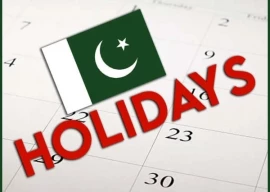
The contradictions of human behaviour are enormously amazing and often beyond belief. Many among us aspire to immigrate to foreign lands, seeking full rights and privileges there - from the acceptance of hijabs, niqabs, mosques and madrassas to representation in their parliaments. Yet, in our own country, we struggle to tolerate "outsiders/mojhajirs" like the Biharis, who made incalculable sacrifices for the creation of Pakistan. Their genocide and ethnic cleansing during the tragic and merciless events leading up to the surrender on December 16, 1971, remain unrecognised.
Nearly everyone loves Bihari kebabs and the spellbinding portraits and poetry of the internationally acclaimed poet and bureaucrat, Bihari Parveen Shakir. Perhaps this is because these things can be bought and sold, marketed to pull crowds at so-called adabi and amn melas, or attract customers. Or maybe it is because they are perceived as benign. These "commodities" pose no threat of claiming political spaces, altering the demographics of the land of sufis and saints, or challenging political elites and national stakes in this country. When it comes to the stateless and devastated Bihari community – especially those confined to the 6X6/7X7 cages in 66 overcrowded shanty towns of Bangladesh, burdened by generational trauma - the response ranges from deafening silence to audible contempt. Some, including sitting legislators, have the impudence to offer reprehensible arguments, declaring them illegal, non-Pakistani and instructing them to remain in those very "camps", or, for those who have arrived in Pakistan, to live without legal identity and, consequently, without rights.
I watched Pakistani TV channels and scrolled through social media on December 16, 2024, only to discover that the dismemberment of Pakistan had completed 53 years. Yes, there were some carefully curated words about the deprivation of the Bengalis, but there was no mention of my community, who endured the wrath of the Muslim Mukti Bahini because the elites of West Pakistan were not accessible to them.
Many of my liberal and democratic friends do not appreciate my admiration for the custodians of our borders. At times, they ask why I do not call out politicians or engage with them to build solidarity for this cause. I look at them helplessly. These intelligent individuals, known for their intellectual strength, have likely never read my think pieces or viewed my podcasts. Or perhaps they are too naïve to grasp the dynamics of power, its correctness and lawfulness, the substance, sincerity and sovereignty of our political representatives. Good hearted and people-centric politicians are too rare here. The vast majority is hostage to their own interests and are neither tired nor embarrassed on building consensus on their own perks and privileges. When they commit indefensible compromises, they have no right to point fingers at military rulers for their failures, without any sense of accountability. One cannot have their cake and eat it too.
Fifty-three years have passed, and the punishment shows no sign of ending. Perhaps the crime is too grave: an unwavering love for Pakistan and standing with the Pakistan Army in 1971. I do not know how long I can keep myself going or how long The Express Tribune will continue to accommodate my "problematic perspectives and poignant pleas." This may be my last contribution, with the hope that there still exists an unbiased activist, researcher, or journalist who might dare to speak about harmony, humanity, inclusivity and the plight of non-Bengali Urdu speakers - most of whom are abandoned Pakistani Biharis in Bangladesh. This is the most marginalised community of minorities, one whose rehabilitation and resettlement no one even thinks to mention.
I desire to end this piece on an optimistic note, inspired by the silver lining highlighted and heightened in the media regarding the recent sideline meeting between Mr Shehbaz Sharif and Dr Muhammad Yunus in Egypt. I trust that the people and parliaments of both countries remember that Dr Yunus went to the United States as a Pakistani student and returned to Bangladesh in 1974. As a Nobel Peace Laureate, he is mandated to advocate for the human rights of all disadvantaged people, including stranded stateless Pakistani Biharis in his country. As the Prime Minister of the Islamic Republic of Pakistan, it is Mr Sharif's legal and moral obligation to address the plight of these 300,000 forgotten Pakistanis or, at the very least, bring this agenda to the table.
Pakistan: We still love you
Bangladesh: You are still a brother
Diversity: We celebrate you



1735040357-0/Untitled-(100)1735040357-0-165x106.webp)








1734899716-0/image-(15)1734899716-0-270x192.webp)

1732012115-0/Untitled-design-(14)1732012115-0-270x192.webp)





COMMENTS
Comments are moderated and generally will be posted if they are on-topic and not abusive.
For more information, please see our Comments FAQ